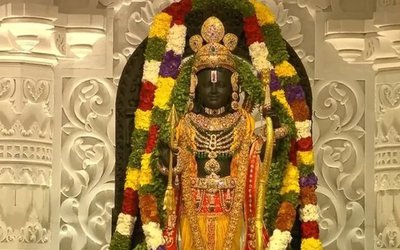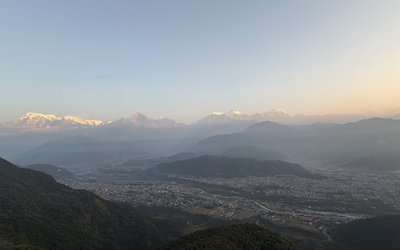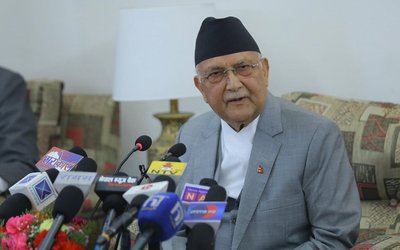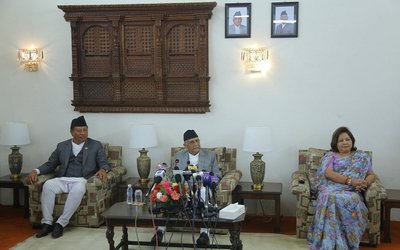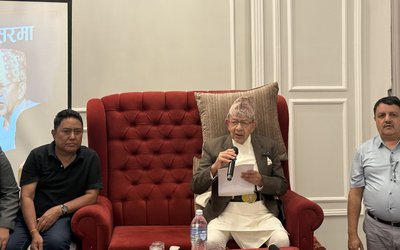People need not be much unhappy at the moment because feedback on the charter draft constitution has been collected in just 15 days from 240 constituencies in 75 districts and a budget with a total outlay of Rs. 819 billion has been presented for the fiscal 2072/2073.The reasons for not much unhappiness are- 1) in the midst of skepticism and speculation both within CA and outside, it would not be an exaggeration to say that inputs from the mass was collected on the stipulated time in a relatively obstruction-free environment, notwithstanding some sporadic incidences of disturbance and, 2) the annual budget has been allowed to be presented on time and peacefully on more time in the Legislature Parliament of CA.If this happens a few more times in the future, people will undoubtedly erase from their memory the bitter incidents of the past when on one occasion lawmakers belonging to a party indulged themselves in a very unpleasant act of manhandling then finance minister and the security personnel present. Besides this act, parties in opposition obstructed annual presentation of the budget on several occasions, which caused unnecessary delay in passage and execution of the budget, leaving major portion of the money under capital expenditure head unspent each year. Hope these are now things of the past.
Despite cadres of Mdhes-based parties obstructing programmes to collect opinion of the people at some places, Committee on Citizen Relations and Public Opinion Collection not only collected feedback from the mass on time but also submitted its report on the inputs to CA chairman without any delay. In keeping with the work accomplished in a speedy manner, the CA also deliberated on the report and sent it to the Constitutional Political Dialogue and Consensus Committee (CPDCC).This body of CA was expected to make its recommendations to the Constitution Drafting Committee (CDC), which would improve the draft constitution incorporating the recommendations received. The speedy progress has slowed down after hitting the CPDCC point. There are still differences amongst political parties on the question of state restructuring, judiciary, religion, etc but looking at the speed with which tasks have been accomplished in recent times, it would be unwise to doubt major leaders ‘intention to bring the new constitution without wasting much time. Hope CPDCC chair Bhattari’s allegation that some of the key provisions duly approved were mysteriously missing in the draft distributed to people, failure to accomplish the task in the given time of four days and his decision to postpone committee meeting for an indefinite period does not derail the constitution framing process speedily heading towards a happy conclusion soon. Many are hopeful that after the promulgation of the constitution, which hopefully will end long-prevailing political instability, the nation would embark upon a new phase of economic progress and prosperity .The current budget made public little before the expected time of the new constitution and some weeks after the devastating earthquakes seems to have endeavored towards moving the economy in the right direction.
The current budget has focused on reconstruction, rehabilitation and infrastructure development and provided support to different sectors of the economy. By not imposing additional taxes and reducing their current levels in some cases along with subsidy, the budget intends to enhance production-oriented activities in the economy. Although revenue (Rs.475 billion) is still less than the estimated current expenses of Rs.485 billion, figures related to different heads under the income and expenses titles do not appear unrealistic. Different provisions in the budget such as Rs. 91 billion set aside for reconstruction, Rs.3.19 billion for Postal Highway,Rs. 2.5 billion for up gradation of Gautam Buddha Airport and provision for up gradation of East-West Highway to four lanes are likely to generate lots of economic activities in the country. Moreover, the announcement that all villages will have access to road and electricity in three years is an encouraging message in the current depressing moments when increasing number of youths from rural Nepal have left the country for employment outside. Likewise, provision of Rs. 6.1 billion for subsidy on fertilizer and seeds and developing paddy production pockets in Terai could go a long way in achieving the expected growth rate of 6 percent, which many say will be difficult to get. Undoubtedly, our capacity constraints experienced thus far leave enough room for us to be doubtful about the targeted growth rate but would anyone excuse the finance minister if he had come out with anything less especially in the face of huge capital expenditure(Rs.208 billion) and the need for a speedy growth to graduate to the developing country status and thence to middle income country level by 2040.Further,the weak base(3.01 percent growth in 2071/72) has provided an opportunity for us to do relatively better in the current fiscal.
The most disturbing element of our economy has been the trade balance which has deteriorated sharply over time. In recent times, trade gap has further widened basically because our exports (iron, garments, etc) are largely import-based and sent on the global market without much value addition. Further, foreign employment of Nepalese youths has increased purchasing power of the people but weakened the production base, forcing the nation to depend on imports even for things like rice, fruits and meat animals in this agricultural country. In the fiscal 2067/68, imports stood at Rs. 397 billion and exports approximated Rs. 64 billion and in the very next year they were Rs.498 billion and Rs.74 billion, respectively. If we look at the export/import figure of the last fiscal and compare it with those of fiscal 2067/68S, we see that imports have doubled (Rs.801 billion) but exports (Rs.89 billion) have gone up only by Rs. 15 billion. More alarming is the fact that last fiscal’s budget was Rs.618 billion, while import of goods and services into the country surpassed the budgetary outlay of that year by little less than Rs. 200 billion.
Looking at the speed with which Nepal’s external sector is deteriorating, it seems our government has no choice but to concentrate on increasing production of goods with the primary aim of substituting import and then think about export, after becoming self reliant in certain items. Undoubtedly, agriculture should be the first choice to produce different agricultural products to feed its increasing population. It was a terrible mistake committed in the past that we withdrew whatever little support was provided to this major sector of the economy, making our agricultural products less competitive in internal as well as external markets. It clearly had a dampening effect on farmer’s initiative to produce because it was cheaper for them to get engaged in off farm activities and buy less costly food from outside. It is encouraging to note that corrections have been made and provisions related to interest subsidy, capital subsidy and tax cuts/waivers are clearly stated in the budget. The challenge before us is to implement whatever has been promised and be able to spend budgetary apportionments because it is said that large sum of money allocated for subsidy even in agriculture remained unspent last year, let alone the overall capital expenditure that remains largely unspent every year. Finance Minister Mahat seems to have realized this capacity related deficiencies/constraints because he has declared this fiscal as “budget implementation year”. If implementation progresses as wished in the budget, we can achieve meaningful progress not only in agriculture but in other sectors of the economy for which adequate support and provision has been made. Further, the earthquake-related reconstruction and rehabilitation activities to be carried out under the Authority are likely to generate lots of employment opportunities and economic activities that would complement activities in other sectors of the economy.
Differences that have surfaced in recent times between parties and leaders have seriously disturbed the people. Issues such as delineation of federal states, religion, citizenship, etc are yet to be resolved. More worrying is the widening difference between the two coalition partners (NC and UML) on demarcation issues: NC wanting delineation of states prior to the promulgation of constitution and UML wanting it after it, demanding a strict adherence to the sixteen-point deal signed by the four parties.Further, NC has one more task of addressing the concern on budget of UCPN, Maoist whose lawmakers have been boycotting the House business. Hope their concerns are also quickly addressed like those of UML’s demand and concerns, without wasting much time because any delay in budget implementation is bound to result in slackening economic activities as has been the case so far. How can we think our leaders are not aware of this? Hope they succeed in reaching consensus on contentious issues soon.

Dr. Tilak Rawal
Dr. Rawal is former governor of NRB.
- Six Months Of Deuba And Oli
- Jan 25, 2025
- Prachanda Outsmarted
- Jul 19, 2024
- Prachanda Outsmarts Again
- Apr 14, 2024
- Prachanda Completes One Year
- Jan 26, 2024
- Terrible Times To Continue
- Oct 12, 2023






